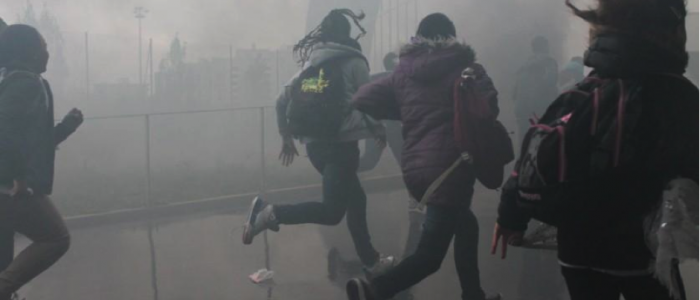The Society of Post-Control
Conference
Tolhuistuin, Amsterdam
Sunday January 22, 12.00 – 18.00
In his essay Digital Tailspin, German media researcher Michael Seemann maintains that we have irrevocably lost control of our digital data. Seemann outlines ten rules for our relationship to the Internet under conditions of post-control. [1] The unstoppable series of high-profile leaks (far beyond the confines of WikiLeaks), the recent hacks of users databases of massive online consumer services, and the excessive personal data-mining practices of mainstream social media platforms, all testify to this.
While this loss of control is primarily driven by technology, it is not restricted to the digital domain. Seemingly uncontrollable flows of migration, the ruthless forces of economic globalisation and global finance, along with the growing weight of ecological and demographic pressures all contribute to the sense that control is at best only temporary and partial. We call this context in which technological, demographic and socio-economic systems have reached such levels of overwhelming complexity that they produce an increasing number of unpredictable (and therefore uncontrollable) outcomes The Society Of Post-Control.
What American Lebanese theorist, Nassim Nicholas Taleb, dubbed “Black Swan events”, low predictability and high impact events, are quickly becoming a part of everyday reality. The first to identify and address these developments systematically was Sociologist, Ulrich Beck in the book the Risk Society (1986) in which he argued that post-war social capitalism’s program of managing risk by making side effects calculable was being progressively eroded by an increasingly borderless world with its communications networks and complex supply chains we call globalisation. Beck argued that institutions including the natural sciences were still struggling to understand or accept the crucial difference between the era of probability and that of radical uncertainty, let alone come to terms with the fact that it was radical uncertainty that had become dominant.
The current drive of governments and intelligence agencies to deploy ever more dense networks of surveillance technology only adds to the overall complexity of these systems, thereby increasing the potential of generating unpredictable and uncontrollable (‘Black Swan’) events. This seems to be a self-defeating strategy. At the same time, the tactics of political engagement once identified with tactical media, culture jamming and what the Situationist’s frontman Guy Debord once described as ‘détournement’, turning the narratives of established power against themselves, is no longer the exclusive domain of progressive political and civic agents. The ‘meme wars’, once identified by Adbuster’s Kalle Lasn and Micah White have been effectively appropriated by reactionary political forces, not least by the so-called “alt.right” groups during the last US Election in support of the Trump campaign, and with great success. Even the creators of famous image memes such as Pepe the Frog admit that they have lost control over their own creations. [2]
How do civic rights advocates, activists, image makers and artists respond to this evolving context of Post-Control? Are there new opportunities for progressive emancipatory politics that are able to surf the chaos as effectively as the insurgent populists of the new right? In short, how to respond to ‘Post-Control’ online and offline?
These questions we intend to discuss in a one-day discussion gathering at the Tolhuistuin, in a conversation across different disciplinary and political boundaries, as part of the Tactical Media Connections public research trajectory. [3]
References:
[1] Michael Seemann, Digital Tailspin: Ten Rules for the Internet After Snowden (2015):
[2] Daily Dot: Pepe the Frog creator says pro-Trump memes ‘just a phase’
[3] Tactical Media Connections:
Speakers:
Michael Seemann
Geert Lovink
Ingrid Eel
Ian Alan Paul
Bernardo Gutiérrez
Steve Kurtz
Marc Tuters
Kim de Groot
David Garcia
Eric Kluitenberg (moderator)
============================================
Support:
Tactical Media Connections and the public program is made possible by the generous support of:
And our partner organisations.
============================================
Support:
Tactical Media Connections and the public program is made possible by the generous support of:
And our partner organisations.

Comments are closed.